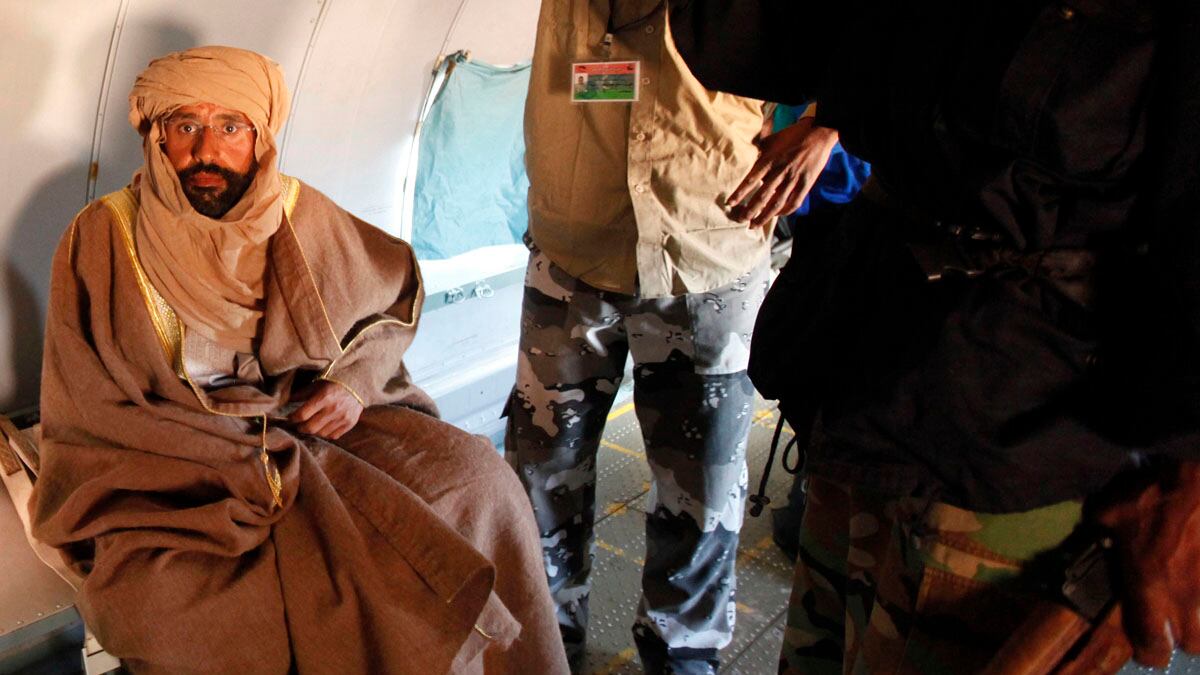The unelected interim government of Libya has announced its intention to put Saif al-Islam Gaddafi on trial in Tripoli, to face the death penalty (if he is not murdered before trial like his father). The European Union insists that he must be tried for crimes against humanity in The Hague, where capital punishment is forbidden. Should Saif get a fair trial from the International Criminal Court, or an exercise in “wild justice”—aka revenge?

Saif has been indicted by the ICC prosecutor for crimes against humanity—urging and arranging the killings of civilians. Jurisdiction comes from a reference to the ICC by Security Council Resolution 1970, pursuant to the U.N. Charter’s power to restore peace and security. A crime against humanity is defined in Article 5 of the ICC Statute as one of the four “most serious crimes of concern to the international community as a whole,” and should obviously take precedence over the individual charges of murder and corruption that Saif would face in Libya.
Besides which, that country has no functioning justice system. Serious cases were always decided by lickspittle judges—these puppets were responsible for the travesty trial of the Bulgarian doctors and nurses convicted of conspiracy to spread HIV-AIDS to children in order to cover up for the failings of Gaddafi healthcare. Although the ICC is a court of last resort, Article 17 of its statute envisages that it should undertake trials of international crimes when the local justice system is in a state of “substantial collapse” or cannot operate impartially. That is precisely the case in Libya: If Saif manages to avoid pre-trial assassination, he will face a hastily constructed court which will speed him to hastily constructed gallows.
Good riddance? Actually, Saif has the makings of an arguable defense. He was, after all, a member of Libya’s legitimate government and thus entitled to urge and to use force reasonable in the circumstances to put down an armed insurrection. In The Hague, if Saif plays by the rules, he could put the prosecutor’s case to a scrupulously fair test. He would be permitted to summon witnesses to his good character—his friends Tony Blair and Peter Mandelson perhaps, or one of the LSE professors who took his money. His judges would be independent and his conviction on the basis of proof beyond reasonable doubt would by no means be a foregone conclusion.
If Saif were acquitted by the ICC, or at the end of a prison sentence served with the likes of Mladic and Karadzic, he could then be returned to Libya to face local charges, so long as they were different to those already decided by the ICC and so long as Libya had by then built up a functioning justice system and was willing specifically to undertake that he would not face a death sentence.
The importance of sticking to this procedure in Saif’s case is that it will be the precedent for Al-Sanussi, the other remaining indictee, who has also been captured. This long-time head of Gaddafi’s intelligence service is hated (with good cause) by locals and is particularly vulnerable to a lynching. But protecting his life is vital to uncovering the truth about Lockerbie, the UTA bombing over Chad (for which he was convicted in absentia in France) and assassinations he planned throughout Europe. A true international terrorist, he should face the ICC and other European courts before he is returned to local justice. There must be no capital punishment for him either—dead men tell no tales.
The difficulty in keeping Saif safe is that the unelected junta now running Libya is under popular pressure to put him on a show trial, and they do not want to court unpopularity in the run up to elections. They will need to be given a good reason to deliver Saif to The Hague and that will mean strong statements from NATO leaders, and especially from President Obama, requiring international justice to take priority. NATO decided (in effect, if not in terms) that the protection of civilians required a war for regime change: it must now insist that Saif, a prisoner of war, be accorded his right to a fair trial before independent judges under the Geneva Conventions, which are binding on the Libyan government. NATO leaders have a clear duty, in these circumstances, to demand that he be put in the ICC dock as soon as possible.
Otherwise, we risk a repeat of the wretched proceedings against the Iraqi leaders. Because the U.S. insisted that Saddam suffer the death penalty, international justice was never allowed to consider his crimes of genocide against the Kurds and the Marsh Arabs. Instead, the cellphone pictures of his squalid death—after conviction by a court whose president was sacked as soon as he showed any signs of fairness—mark a trial that was a travesty.
There is a mistaken assumption that if Gaddafi is tried in The Hague, people in Libya will not see justice done. On the contrary, all ICC trails are televised, and Libyans will be able to see Saif’s trial in real time. And there is nothing in the ICC Statute that confines trial proceedings to The Hague: the court may move to Libya, if security permits, for part or all of its hearings. The ICC prosecutor is meeting the interim government this week, and could offer this compromise: send Gaddafi to The Hague now, and once his safety and the court security can be guaranteed, we will consider holding some hearings in Libya. However, it must be recognized that this happy prospect will be some time in the future: Saif is currently being held in Zintan, where the local community wants to put him on trial and is refusing to hand him over to the makeshift government in Tripoli.
That government is bound by the international law which secured its victory—which was also a victory for the wider principle of international justice on political and military leaders who commit crimes against humanity. If resolution 1970 is to serve as a worthy precedent for international justice—with Syria’s President Assad hopefully the next in line—then it must have a decent denouement. The new Libya began with the obscene killing of Colonel Gaddafi: his son and one-time heir should be allowed to answer allegations about international crimes in an international courtroom.






